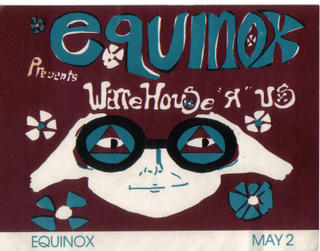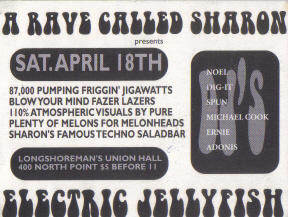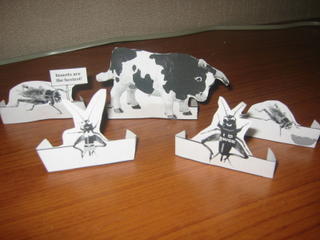I Walk So Tall
Ascending I Stand So High
Earth Below Me
Revolving Above The Sky
I Feel No Fear
To Be Here Is Oh So Fine
Shining Brightly
Like Sunlight Inside My Mind
- Lyrics From “Move Any Mountain” by The Shamen (1991)
Sitting in the back seat of Amy’s Volvo station wagon with Jody, on the way downtown to Club Pegasus – it started to come on. I felt shaky, confused and lightheaded. I wondered if I had made a mistake. As my consciousness started to swirl, I leaned over and put my head on Jody’s leg. I soon found myself giggling, deeply amused by how nice it felt to knead his thigh. Jody was significantly less amused.
We parked in the garage next to Pegasus. I stepped out of the car and tried to explain to Amy and Jody how surreal everything looked. I thought I probably shouldn’t go into the club, until I figured out where this was going. But I was supposed to meet Erik, Mitchell and Glenn inside and they were the only ones who had been where I was at that moment. When the door opened and the music flowed over me, I immediately knew I would never be the same.
Until that night, my life had been defined by words like abandonment, abuse, rejection, shyness and depression. If you’ve been reading for a while, you know that my childhood was, let’s say, somewhat unorthodox. By the end of high school, I felt like the boy in the bubble. I felt disconnected from everything and everyone, as if I were just observing life and not participating. I had a few really close friends, but years of dealing with my circumstances left me perfectly numb. Music was like an air tube to my bubble. It allowed me to breathe and connected me in some distant way to our existence.
The numbness went away that first night. For the first time ever, I felt a part of the world around me. It’s a bit like a dream, but I remember introducing myself to just about everyone in the club. I remember Mitchell putting me on his shoulders on the dancefloor, and shoving marshmallows in my mouth in the bathroom. I remember how “Elevation” by Xpansions and “Move Any Mountain” by the Shamen seemed to be portals to some universal rhythmic truth inside of me.
I also remember telling my roommate Ted, in the car, on the way home, about the abuse I had endured as a kid. I had never told anyone before, because I was too embarrassed and ashamed. Listening to Deee-Lite on the tape player, Ted listened while I took the first steps toward healing. Ecstasy allowed me to look inside - painlessly. It allowed me to confront my past – without confrontation. It allowed me to share my feelings with others, without shame or humiliation.
Two weeks after that first night, Mitchell had his S.E.A.R.S. (Sell Everything And Run Swiftly) sale and left Pittsburgh for San Francisco. A few weeks after that, he called me at 4 in the morning from a payphone at a rave called the Whoopi Ball. He, and 100 of his new best friends, convinced me to drop everything and head out for the second Summer of Love. I moved to San Francisco in March of 1992, as the rave scene was getting set to explode. My first rave was called Toon Town – UFOs Are Real. The rave scene and Ecstasy became a totally spiritual experience for me. I explored myself and my connection to others while the bass pumped all night long, and I learned to integrate important aspects of the experience into my everyday life. To this day, I feel the deepest possible gratitude for having been able to experience the magic of that time and place.
 I am sure that Ecstasy saved my life. I’ve done Ecstasy well over a hundred times. Let’s see. 52 weeks in a year….carry the 4…okay…probably closer to two hundred times. I’ve done Acid, Mushrooms, Pot, Crystal Meth, Cocaine, GHB, MDA, 2CB, Alcohol, Downers and Special K. I developed good relationships with some of them, bad relationships with some and no relationships with others. I’ve also finished a Master’s degree in Sociology, excelled at a “respectable” job, volunteered my time to teach kids at the Museum of Science and maintained deep friendships for decades. I vote in every election, donate money to charities and sometimes pick up litter off the street.
I am sure that Ecstasy saved my life. I’ve done Ecstasy well over a hundred times. Let’s see. 52 weeks in a year….carry the 4…okay…probably closer to two hundred times. I’ve done Acid, Mushrooms, Pot, Crystal Meth, Cocaine, GHB, MDA, 2CB, Alcohol, Downers and Special K. I developed good relationships with some of them, bad relationships with some and no relationships with others. I’ve also finished a Master’s degree in Sociology, excelled at a “respectable” job, volunteered my time to teach kids at the Museum of Science and maintained deep friendships for decades. I vote in every election, donate money to charities and sometimes pick up litter off the street.
 I don’t think that everyone should do Ecstasy. I don’t think everyone should experiment with or use drugs at all. I know some people who feel that their Ecstasy use caused fairly serious bouts of depression afterwards. I know a lot of people who developed very bad relationships with some drugs and suffered greatly with addiction problems. I, myself, went to a very dark place with crystal meth, and have been fighting nicotine addiction for years.
I don’t think that everyone should do Ecstasy. I don’t think everyone should experiment with or use drugs at all. I know some people who feel that their Ecstasy use caused fairly serious bouts of depression afterwards. I know a lot of people who developed very bad relationships with some drugs and suffered greatly with addiction problems. I, myself, went to a very dark place with crystal meth, and have been fighting nicotine addiction for years.
 So, should I be in prison? According to the Drug War proponents, I am a criminal. I am a bad person. I am an immoral person. There are people serving long prison sentences for doing exactly what I did. Is that really a moral solution?
This is the last installment of my War on Drugs trilogy. We will now return to our regularly scheduled blogging. For further information...check out MAPS, November Coalition and DanceSafe.
So, should I be in prison? According to the Drug War proponents, I am a criminal. I am a bad person. I am an immoral person. There are people serving long prison sentences for doing exactly what I did. Is that really a moral solution?
This is the last installment of my War on Drugs trilogy. We will now return to our regularly scheduled blogging. For further information...check out MAPS, November Coalition and DanceSafe.
 Thanks to Valerie over at Forward Ho! for a giving me something to do at work - and thanks to Moobert and the Crickets for being > Tab!
Thanks to Valerie over at Forward Ho! for a giving me something to do at work - and thanks to Moobert and the Crickets for being > Tab! Thanks to Valerie over at Forward Ho! for a giving me something to do at work - and thanks to Moobert and the Crickets for being > Tab!
Thanks to Valerie over at Forward Ho! for a giving me something to do at work - and thanks to Moobert and the Crickets for being > Tab! I am sure that Ecstasy saved my life. I’ve done Ecstasy well over a hundred times. Let’s see. 52 weeks in a year….carry the 4…okay…probably closer to two hundred times. I’ve done Acid, Mushrooms, Pot, Crystal Meth, Cocaine, GHB, MDA, 2CB, Alcohol, Downers and Special K. I developed good relationships with some of them, bad relationships with some and no relationships with others. I’ve also finished a Master’s degree in Sociology, excelled at a “respectable” job, volunteered my time to teach kids at the Museum of Science and maintained deep friendships for decades. I vote in every election, donate money to charities and sometimes pick up litter off the street.
I am sure that Ecstasy saved my life. I’ve done Ecstasy well over a hundred times. Let’s see. 52 weeks in a year….carry the 4…okay…probably closer to two hundred times. I’ve done Acid, Mushrooms, Pot, Crystal Meth, Cocaine, GHB, MDA, 2CB, Alcohol, Downers and Special K. I developed good relationships with some of them, bad relationships with some and no relationships with others. I’ve also finished a Master’s degree in Sociology, excelled at a “respectable” job, volunteered my time to teach kids at the Museum of Science and maintained deep friendships for decades. I vote in every election, donate money to charities and sometimes pick up litter off the street. I don’t think that everyone should do Ecstasy. I don’t think everyone should experiment with or use drugs at all. I know some people who feel that their Ecstasy use caused fairly serious bouts of depression afterwards. I know a lot of people who developed very bad relationships with some drugs and suffered greatly with addiction problems. I, myself, went to a very dark place with crystal meth, and have been fighting nicotine addiction for years.
I don’t think that everyone should do Ecstasy. I don’t think everyone should experiment with or use drugs at all. I know some people who feel that their Ecstasy use caused fairly serious bouts of depression afterwards. I know a lot of people who developed very bad relationships with some drugs and suffered greatly with addiction problems. I, myself, went to a very dark place with crystal meth, and have been fighting nicotine addiction for years. So, should I be in prison? According to the Drug War proponents, I am a criminal. I am a bad person. I am an immoral person. There are people serving long prison sentences for doing exactly what I did. Is that really a moral solution?
So, should I be in prison? According to the Drug War proponents, I am a criminal. I am a bad person. I am an immoral person. There are people serving long prison sentences for doing exactly what I did. Is that really a moral solution?